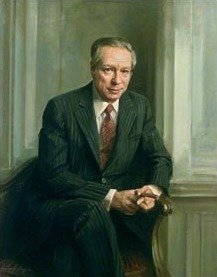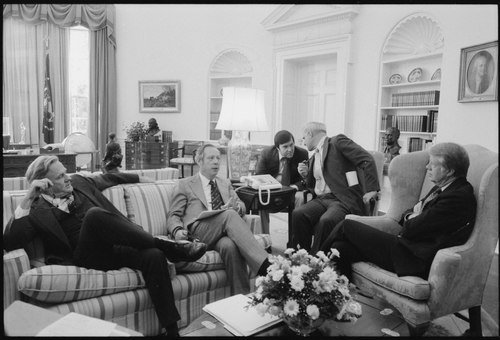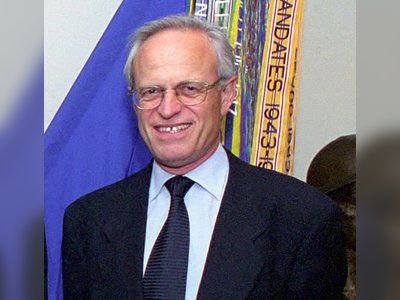Werner Michael Blumenthal
Werner Michael Blumenthal, known as W. Michael Blumenthal, was a German-born American businessman, economist, and politician who served as the United States Secretary of the Treasury during the presidency of Jimmy Carter from 1977 to 1979.
In 1939, at the age of 13, Blumenthal and his family fled Nazi Germany and endured the tumultuous years of World War II in the occupied Shanghai ghetto under Japanese control until 1947. Afterward, he arrived in San Francisco, where he worked various odd jobs to support his education.
Blumenthal attended college and eventually completed his studies in international economics at the University of California, Berkeley, and Princeton University, achieving degrees in his field. Throughout his career, he was active in both the business and public service sectors.
Before assuming his role in President Carter's cabinet, Blumenthal had a successful career and held positions in the administrations of Presidents John F. Kennedy and Lyndon B. Johnson.
As Carter's Treasury Secretary, he played a pivotal role in shaping economic policy and was involved in fostering improved relations with China. After resigning, he served as Chairman and CEO of Burroughs Corporation, which later merged and became Unisys.
Following this, he dedicated 17 years to leading the restored Jewish Museum in Berlin. Blumenthal authored books including "The Invisible Wall" (1998) and "From Exile to Washington: A Memoir of Leadership in the Twentieth Century" (2013).
Childhood in Nazi Germany
Werner Michael Blumenthal was born in Oranienburg, in the Weimar Republic (now in the state of Brandenburg, Germany) on January 3, 1926. He was the son of Rosa and Valeri Blumenthal, members of a modest Jewish family who owned a clothing store. His family's roots in Oranienburg dated back to the 16th century.
However, as the Nazi Party's Nuremberg Laws were enacted in 1935, the family began to fear for their lives and realized they needed to escape Germany. Blumenthal vividly remembered Kristallnacht, a coordinated series of attacks against Jews and their property that occurred throughout Germany on November 9, 1938.
"I remember vividly... when they came and smashed all the Jewish stores. I saw the largest synagogue in Berlin in flames, and I remember being beaten up by kids in uniforms," he recalled.
The Gestapo raided the Blumenthal family's home one morning in 1938, arresting the father without providing any reason. Werner's father was taken to Buchenwald, one of the largest concentration camps in Germany, where approximately 56,000 people, mostly Jews, were murdered.
Werner's mother managed to sell the family's property and secure her husband's release from captivity. They had no choice but to sell their clothing store, which they had owned for many years, for next to nothing.
Werner's older sister, Stefanie, expressed her feelings about the loss, saying, "I remember when my mother sold it – not so much because of the loss, but because of the feeling of unfairness, that someone we had trained to work for, and who could have turned against us, could get something we worked so hard for, for nothing."
Blumenthal reflected on his tough wartime years, saying, "My refugee childhood taught me what it meant to be hungry, poor, and forgotten without injustice. I saw that life could be unfair, that titles, wealth, and decorations of rank are ephemeral, that they are not as important as a person's inner qualities when facing difficult times, failures, and personal defeats."
With the little money they had left, Blumenthal's mother purchased tickets to Shanghai, China, a free port city that did not require visas for entry. The family managed to escape Germany shortly before the outbreak of World War II in 1939, boarding a passenger ship.
They brought only essential belongings and were not allowed to take any significant amount of money with them. Blumenthal described their journey, saying, "From Naples, we sailed through Port Said, Suez, Aden, Bombay, Colombo, Singapore, and Hong Kong. Each of these ports was part of the British Empire, and at none of them were Jewish refugees allowed entry."
Upon arrival, they expected to stay only briefly, hoping they could eventually move to a safer country. However, with the outbreak of World War II, Japan occupied Shanghai, and the Blumenthal family, along with 20,000 other Jewish refugees, found themselves confined to the Shanghai ghetto for the next eight years.
Blumenthal endured severe poverty and hunger during his time in the ghetto, often seeing corpses in the streets. He worked as a janitor in a chemical factory, earning a meager one dollar a week, which he used to buy food for his family.
"I was confined to the remote corner of Asia, so impoverished that I repaired my shoes with newspaper to cover the holes... I had no passport and for two and a half years was an alien to Japan, and even the most junior American consular officer couldn't be bothered with me," he recalled.
Blumenthal's education during this period was sporadic, as the pressure to survive drove his parents to prioritize other concerns. Nevertheless, he managed to learn English during his short time in a British-run school and picked up some Chinese, French, and Portuguese during subsequent periods.
With the end of the Asian conflict in the summer of 1945, American forces entered Shanghai. Blumenthal found work as a stockroom clerk for the United States Army Air Forces, where his language skills proved valuable. In 1947, after numerous efforts by him and his sister to obtain visas for Canada, they were finally granted visas to the United States.
They made their way to San Francisco, where they knew no one, and had only 200 dollars to their name. With limited education and as stateless refugees, Blumenthal did everything he could to make a life for himself:
"I came to this country feeling I had abilities and skills. I read a lot. I talked to people. I wanted to do things. I realized I could cope with life reasonably."
Education
Blumenthal's first full-time job was as a elevating operator at the National Biscuit Company, where he earned $40 a week. He subsequently enrolled in San Francisco City College while supporting himself with part-time jobs, including truck driving, night elevator operating, restaurant busboying, and cinema ushering.
He also worked as a watchman at a labor hiring hall, where he filled "small paper cups with water" in the early morning hours, earning a meager wage. Simultaneously, his wife worked as a secretary, and Blumenthal taught economics at Princeton from 1954 to 1957. He also served as a labor arbitrator for the State of New Jersey from 1955 to 1957.
- ורנר מייקל בלומנטלhe.wikipedia.org






